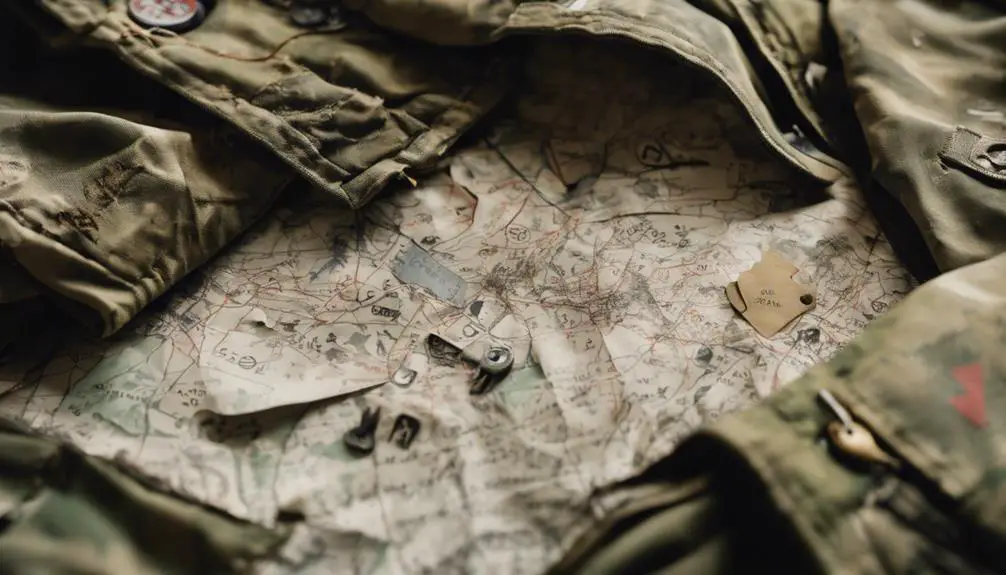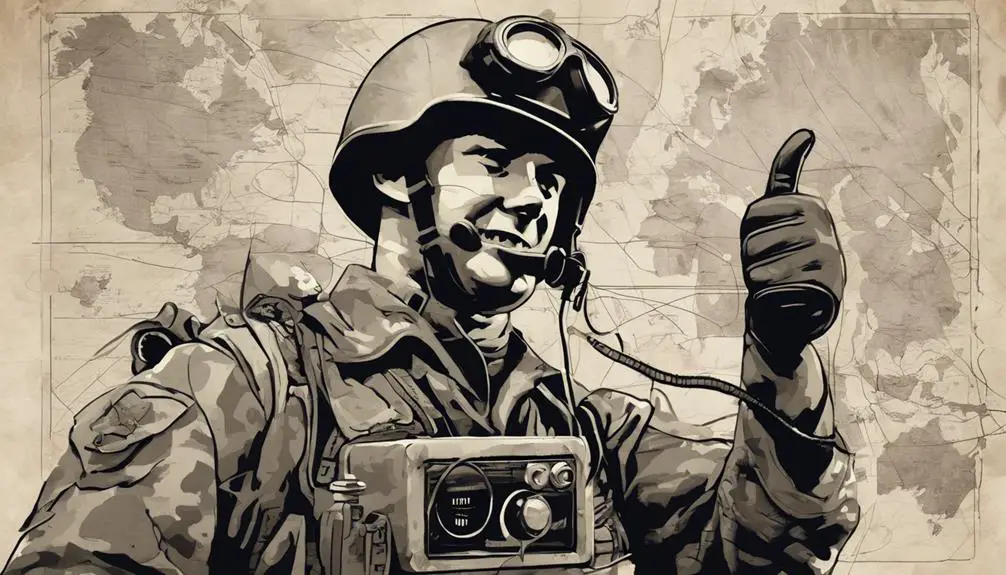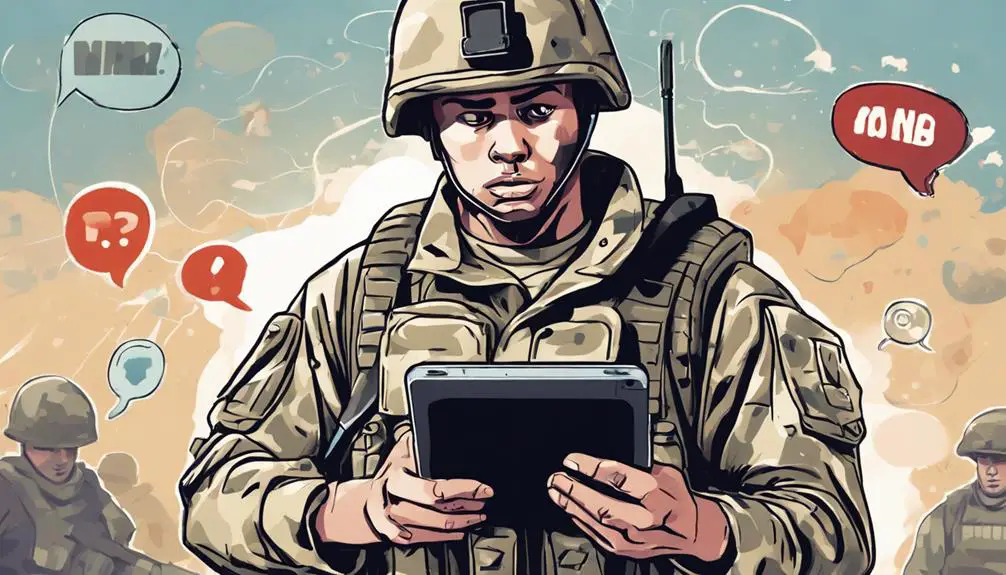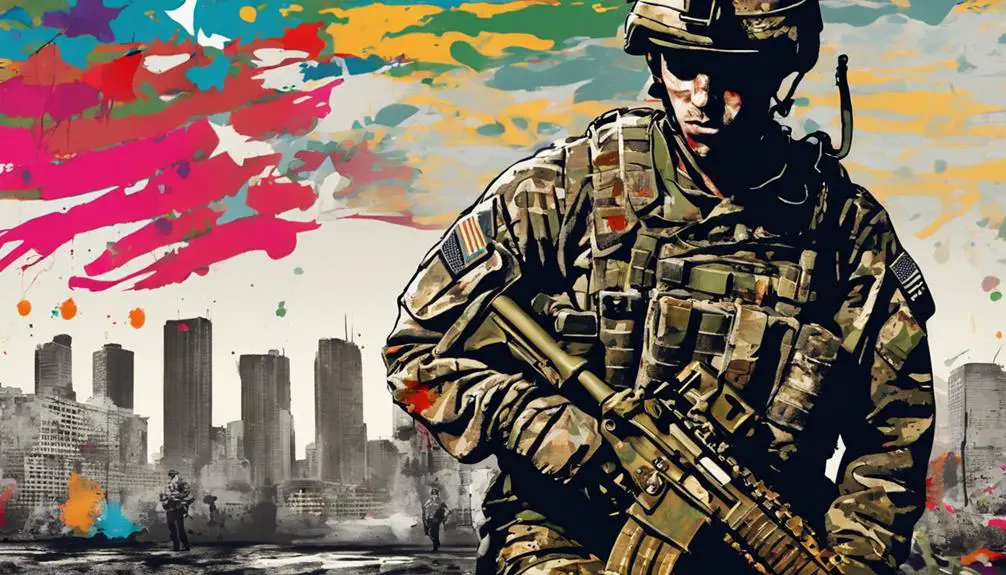When you hear '5 x 5' in a military context, it's not a math problem – it's a way to rate the effectiveness of communication. This phrase evaluates the clarity, signal strength, and reception quality of messages to guarantee seamless information exchange in high-stress environments. It's a feedback loop that helps maintain clear lines of communication, which is vital in the military. By using '5 x 5', the military can fine-tune their messaging and make certain that everyone is on the same page. Want to learn more about military slang and how it's used in everyday life?
Decoding the 5 X 5 Mystery

As you explore the world of military slang, you'll likely encounter the enigmatic '5 x 5' phrase, which has sparked curiosity and confusion among civilians and military personnel alike. This cryptic code has been shrouded in mystery, leaving many to wonder what it means.
To decode this phrase, it's crucial to understand its origins. In the military, '5 x 5' refers to a communication system where messages are rated on a scale of 1 to 5 for clarity, signal strength, and message reception quality.
Code breakers and cryptanalysts might interpret this phrase as a coded message, but in reality, it's a simple rating system. When a message is transmitted, the recipient rates it on these three factors, providing feedback to the sender. This feedback loop guarantees that communication remains effective and efficient.
While it may not be as thrilling as a coded message, the '5 x 5' phrase is an important tool in military communication, allowing personnel to fine-tune their messaging and maintain clear lines of communication.
Situational Awareness in a Flash
In high-pressure situations, you need to quickly grasp your surroundings, and that's where flash situational awareness comes in – an essential skill that helps military personnel rapidly process their environment to make swift, informed decisions.
This ability to rapidly assess a situation allows you to stay one step ahead of potential threats, making it a vital component of Tactical Vigilance.
Flash situational awareness is about quickly taking in your surroundings, identifying potential risks, and prioritizing threats. It's an automated process that's honed through training and repetition, allowing you to make split-second decisions in the heat of the moment.
In a high-stress environment, every second counts, and Rapid Assessment is key to staying alive.
Roger That, Over and Out

You've likely heard military personnel using phrases like 'Roger that' and 'Over and out' in movies and TV shows, but have you ever wondered what they really mean and how they're used in military communication? These phrases are part of a standardized radio protocol used to guarantee clear and efficient communication, especially in high-stress situations.
Here are some key takeaways about these phrases:
- Confirmation: 'Roger that' is used to confirm receipt of a message, indicating that the recipient understands and acknowledges the information.
- Transmission complete: 'Over' indicates the end of a transmission, signaling that the sender is finished speaking.
- Closing the channel: 'Out' means the conversation is ending, and the communication channel is being closed.
- Avoiding miscommunication: Using these phrases helps prevent communication breakdowns, ensuring that critical information is conveyed accurately and efficiently.
Military Lingo in Everyday Life
Beyond the battlefield, military slang has permeated everyday language, with many phrases becoming an integral part of popular culture. You might be surprised to find yourself using military lingo in your daily conversations, without even realizing it.
Phrases like 'break a leg' (meaning 'good luck') and 'bite the bullet' (meaning 'to endure a difficult situation') have become commonplace in civilian language. This phenomenon is a tribute to the power of military slang in facilitating Civilian Integration.
As language constantly evolves, military slang has contributed greatly to Language Evolution, with many phrases being adapted and modified to fit everyday usage. You may have even used phrases like 'on the same page' (meaning 'in agreement') or 'call it a day' (meaning 'to stop what you're doing') without realizing their military origins.
Military slang has become an integral part of our shared cultural lexicon, and its influence shows no signs of slowing down.
Lost in Translation No More

As military slang permeates everyday language, it's no surprise that you're likely to encounter phrases that, at first, might seem confusing or obscure, but with a little context, their meanings become crystal clear.
When language barriers and cultural nuances come into play, understanding military slang can be a challenge. However, by recognizing the cultural context and historical background of these phrases, you can overcome these obstacles and improve your comprehension.
Here are a few examples of military slang that might've initially left you perplexed:
- Roger that: an expression of understanding or confirmation, derived from the NATO phonetic alphabet.
- Sitrep: short for 'situation report,' used to describe a brief update on a situation.
- Oscar Mike: a phrase used to acknowledge that a task or order has been understood and will be carried out.
- HOOAH: an expression of enthusiasm or motivation, often used to boost morale.
Frequently Asked Questions
Are Military Slang Terms Used Universally Across All Branches?
You might think that military slang terms are used universally across all branches, but that's not the case. Branch variations and inter-service dynamics play a significant role in shaping unique slang within each branch.
While some terms might be shared, others are specific to a particular branch or community. You'll find that the Army, Navy, Air Force, and Marines each have their distinct slang, reflecting their individual cultures and histories.
Can Civilians Use Military Slang in Professional Settings?
When considering using military slang in professional settings, you should think twice. While it might seem cool to pepper your language with military terms, it can come across as cultural appropriation.
Remember, professional etiquette is key. Unless you've earned the right to use these terms through military service, it's best to stick with standard language.
You don't want to risk alienating colleagues or clients who might view your language as inauthentic or disrespectful.
Are There Regional Differences in Military Slang Usage?
Picture yourself maneuvering through a linguistic maze, where regional twangs and cultural flavors blend with military jargon.
As you explore the world of military slang, you'll discover that geographic isolation and cultural influences have shaped unique dialects across different regions.
You'll observe that troops from the Deep South, for instance, use distinct phrases that differ from their West Coast counterparts.
Do Military Slang Terms Change Over Time or Remain Constant?
You might wonder if military slang terms change over time or remain constant.
Conducting an evolution analysis reveals that some terms do evolve, while others maintain timeless expressions.
As military operations and technology advance, new slang emerges to describe novel situations and equipment.
However, core values and shared experiences guarantee that certain phrases persist, connecting service members across generations.
Are Military Slang Terms Used in Formal Military Communications?
You're probably wondering if military slang terms are used in formal military communications.
Generally, the answer is no. In formal briefings and official correspondence, the military tends to stick to standardized language to guarantee clarity and precision.
You won't typically find slang terms like 'HOOAH' or 'FUBAR' in these contexts, as they're reserved for more casual, informal settings.
Instead, formal communications prioritize clear, concise language to convey critical information effectively.
Conclusion
You've cracked the code of 5 x 5 military slang, and now you're ready to decode any situation. With situational awareness at your fingertips, you can respond with confidence.
Whether in everyday conversation or high-stakes operations, you've got the lingo down. You're no longer lost in translation, and your communication skills are on point.
You're clear, concise, and in control – a true master of military communication.







